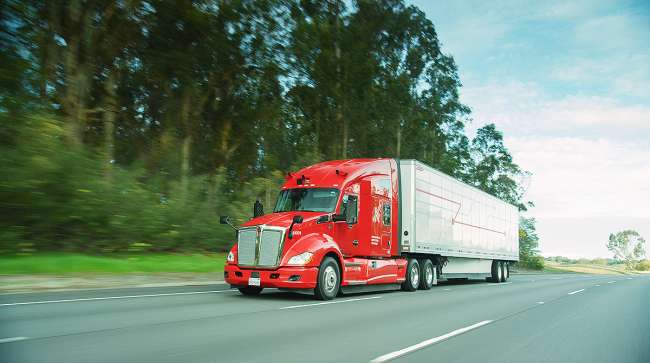Senior Reporter
Kodiak Robotics to Receive CES Award

[Stay on top of transportation news: Get TTNews in your inbox.]
Self-driving technology startup Kodiak Robotics announced it was selected as a CES 2021 Innovation Awards honoree, with the presentation to come during the first all-digital CES, which runs Jan. 11-14.
“Automated truck technology is coming in the next few years,” Daniel Goff, the head of policy at Kodiak, told Transport Topics. “The CES award showed it is important to recognize that. I believe we are the first autonomous trucking company to be recognized as an honoree.”
The innovation awards program is an annual competition to honor outstanding design and engineering in consumer technology products, according to CES, the largest tech event in the world. It is owned and operated by the Consumer Technology Association.
Exciting news! Kodiak is the first self-driving trucking startup to be named a CES® 2021 Innovation Award honoree. Thanks to the Consumer Technology Association for the recognition.https://t.co/weDyejYQ3g pic.twitter.com/JSjZNAlSly — Kodiak Robotics (@KodiakRobotics) December 15, 2020
Kodiak applied for consideration, submitted information on the background of the technology it uses and answered questions from the panel of judges.
Most other self-driving systems, Goff said, are built around very detailed, high-definition maps created after driving a road several times in all lanes to create down-to-the-centimeter details with 3D lasers. Kodiak employs a different approach.
“We have de-prioritized mapping in our system and use simply low-definition maps,” he said, in conjunction with its software and suite of sensors. A Kodiak-equipped truck encountering an unexpected construction zone, for instance, can integrate that new information into a map and deliver it over the air to all the other trucks equipped with the same system, he said, “in real time, over a cellular connection without requiring a lot of data and days to do a remap.”
The challenge is not just in building a system that works once or 100 times, he added, but building toward a system that, “in every conceivable likely scenario” will respond safely. “And then [showing] how you minimize the risk of a system failure if it was to happen.”
A CTA survey suggests acceptance of automated technology could be on the rise. In May, it polled 1,004 people over 18 years old and found 26% of respondents indicated they had a more favorable view of autonomous delivery — including, drones, self-driving vehicles and delivery robots — than before the novel coronavirus health crisis.
“People are more open,” Goff said “to testing these things out.”
The pandemic spurred Kodiak to accelerate its timeline for making deliveries for customers, using its trucks operated manually. It has now done “north” of 600 deliveries, he said.
Even though the trucks were driven manually, there was much still that could be learned about the autonomous system’s performance.
“Something people don’t think about with autonomous vehicles is you can actually get maybe 80% of what you need when they are being operated manually because you can turn on every part of the system except for the controls that actually move the truck,” he said. “And then you can do an analysis of what does the human driver do versus what the truck wanted to do and collect a lot of data that way.”

In this year in review episode, we discuss COVID and everything from gas tax to remote work. With the help of our special Transport Topics guests, Seth Clevenger and Eleanor Lamb, we’ll also begin to map a plan for 2021. Hear a snippet, above, and get the full program by going to RoadSigns.TTNews.com.
Kodiak was founded in April 2018, has grown to about 70 employees and has 10 Class 8 trucks. It operates them on runs from Dallas-Fort Worth to Houston, and back — a distance of 260 miles each way.
“We work closely with a couple of different OEMs,” he said. “We are happy with those relationships. The same with Tier 1 suppliers and sensor providers. We see a growing ecosystem around this technology and think that is really critical.”
And when it is time to go commercial with the technology, how will that work?
But simply offering autonomous technology to a paying customer simply in the form of software as a service is not feasible given the complexity of the technology, he said. “As far as the eye can see, we believe there will be some sort of relationship between the technology developer and the operators of the truck.”
Want more news? Listen to today's daily briefing:
Subscribe: Apple Podcasts | Spotify | Amazon Alexa | Google Assistant | More

